1. They taste with their arms

An octopus doesn’t need its mouth to know how something tastes, it just reaches out with its arms. Each arm is lined with hundreds of suction cups, and each one contains specialized receptors that can detect chemical signals in the water. In simple terms, they can touch an object and instantly know what it tastes like. Imagine if shaking someone’s hand told you how salty or bitter they were, that’s how alien this ability seems. This adaptation helps them identify food, explore their surroundings, and even avoid toxins without swallowing anything dangerous. While it’s a clever survival tool, it’s also deeply unsettling when you picture a creature tasting you just by crawling across your skin.
2. They strangle their mates

In the octopus world, romance can end in a deadly twist. Female octopuses are known for killing or even eating the male after mating, making reproduction a high-risk activity for males. In some species, the male tries to avoid this fate by keeping his distance, using a specialized arm to deliver sperm rather than getting too close. But often, once the deed is done, the female attacks. Scientists think this behavior may provide extra nutrition for the female as she prepares to lay and guard her eggs. It’s a chilling reminder that what might be natural survival behavior to them looks startlingly ruthless to us, and adds to the octopus’s eerie reputation.
3. They can rewrite their own brain code
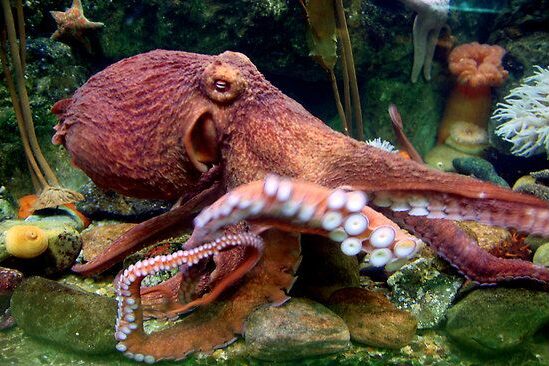
Most animals, including humans, are stuck with the genetic code they inherit, but octopuses play by a different rulebook. They can edit their RNA, a process that lets them essentially reprogram their nervous system on the fly. This means they can adapt to sudden changes in their environment much faster than creatures that rely on slow genetic evolution. For example, they might change how their neurons fire to cope with different temperatures or threats. It’s almost like having software that updates itself instantly to meet new challenges. This unusual biological trick has baffled scientists and adds to the otherworldly aura surrounding octopuses, making some wonder if they’re operating on a level we barely understand.
4. They decorate themselves with bones and shells
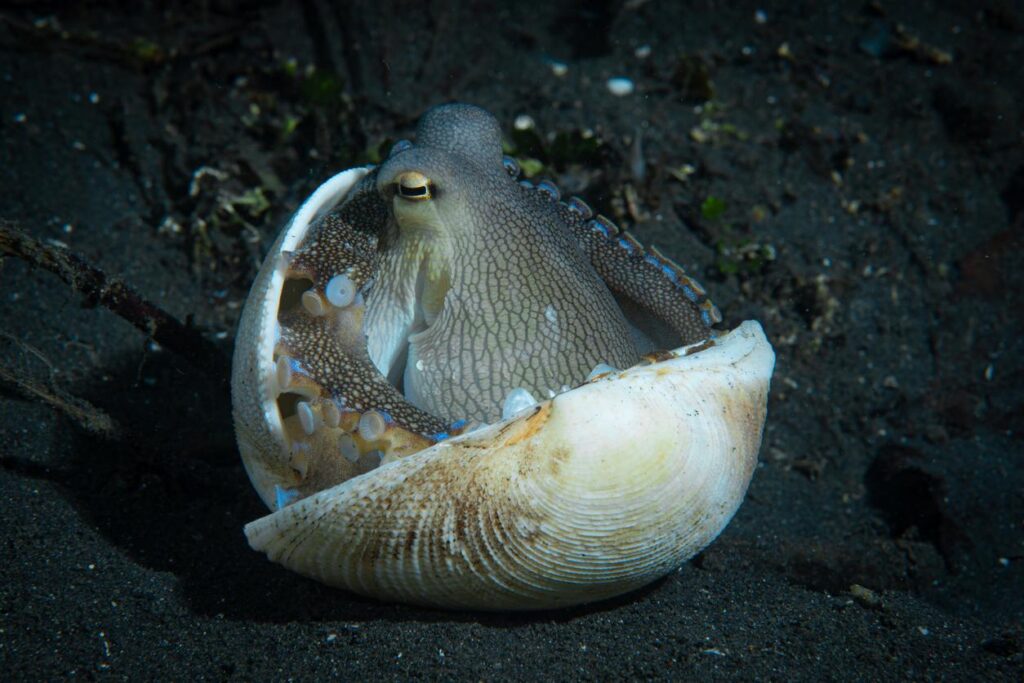
Octopuses are resourceful creatures that often use objects from their environment for disguise or defense. Some species carry coconut shells, sea shells, or even bones, arranging them as portable armor or camouflage. Scientists have observed them stacking these items like shields or hiding beneath them until the coast is clear. One famous example is the veined octopus, nicknamed the “coconut octopus,” which carries split coconut shells across the sea floor to assemble a makeshift shelter. This behavior shows not only intelligence but also planning, a trait once thought to be exclusive to higher animals. While it’s impressive, it also paints a picture of a creature that outfits itself like a survivor in a strange, watery battlefield.
5. They escape any tank
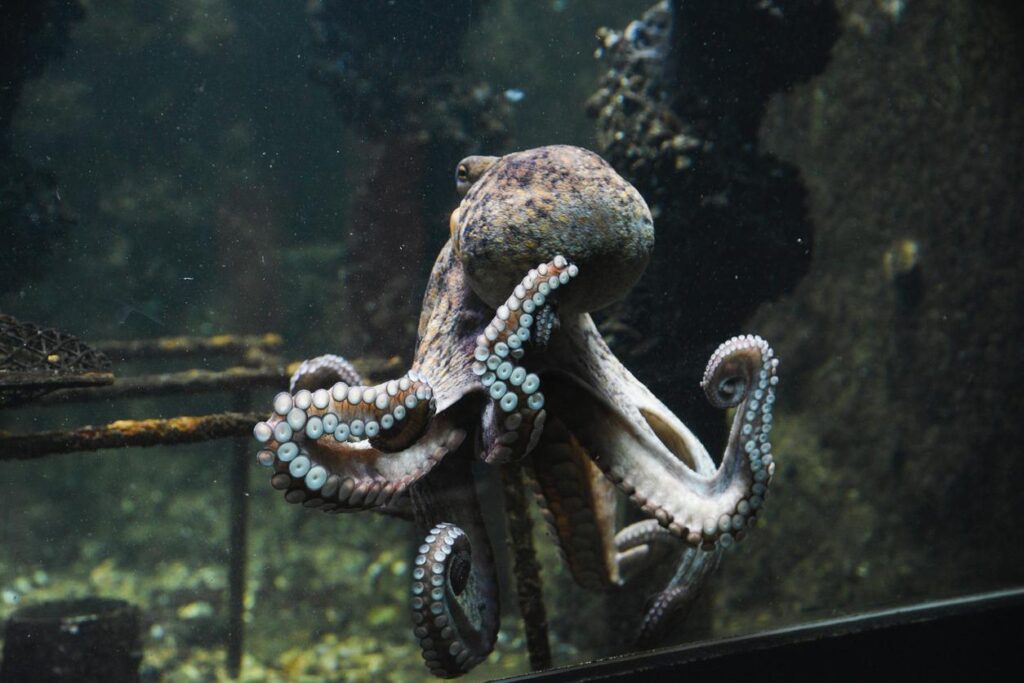
Octopuses are infamous for their Houdini-like escape skills, slipping out of seemingly secure enclosures. Their soft, boneless bodies allow them to squeeze through openings no bigger than their beak, which is the only hard part of their body. In aquariums and labs, there are countless stories of octopuses climbing out at night, slithering across the floor, raiding neighboring tanks for food, and then returning to their own tanks without anyone noticing until later. One famous octopus in New Zealand, Inky, made headlines after escaping through a drainpipe to freedom. These escapes highlight their problem-solving abilities and determination, but they also fuel the idea that octopuses are more than just clever, they might be plotting in ways we can’t quite grasp.
6. Their arms can think on their own
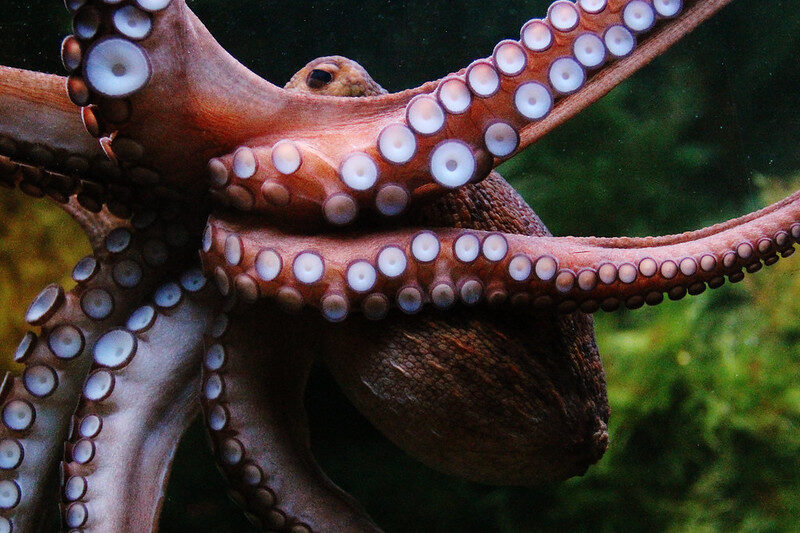
Unlike most creatures, octopuses don’t rely entirely on a central brain to control their bodies. In fact, more than half of their neurons are located in their arms. This means each arm can move, react, and even solve simple problems without waiting for instructions from the main brain. Scientists have seen severed octopus arms continue to grasp objects, respond to touch, and even try to crawl as if they’re alive on their own. While this distributed intelligence helps octopuses multitask, like opening a shell with one arm while exploring with another, it’s undeniably eerie. It’s as if their limbs have a mind of their own, raising questions about what “thinking” really means in creatures so different from us.
7. They change color and texture in milliseconds
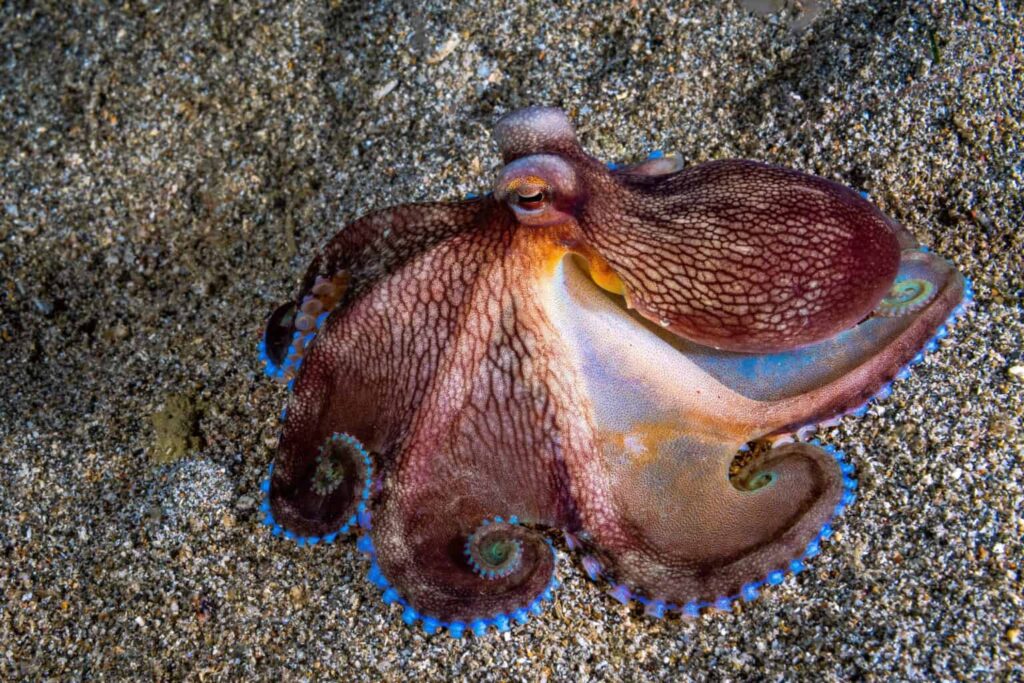
Octopuses are masters of disguise, and their transformations are so fast and flawless that they seem like science fiction. Special skin cells called chromatophores allow them to shift colors almost instantly, blending into coral, sand, or rocks. But they don’t stop at color, they can also change the very texture of their skin, forming bumps or ridges to look like seaweed or stones. This complete body makeover happens in milliseconds, enabling them to vanish before a predator’s eyes or surprise prey with a sudden ambush. Watching an octopus morph so dramatically can feel like watching a shapeshifter from another planet, reminding us just how alien they already are.
8. They’re old really old
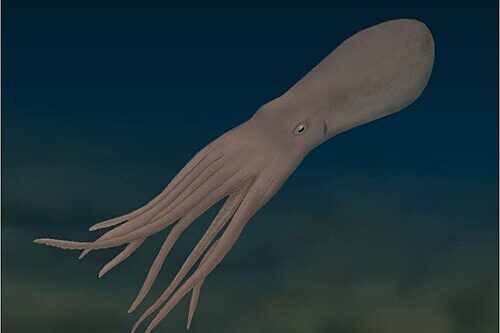
Octopuses are not newcomers to the oceans, they’ve been around for over 300 million years, long before dinosaurs walked the Earth. Their lineage has survived at least five mass extinction events, making them one of nature’s greatest survivors. Fossil records show that ancient octopus-like creatures existed in prehistoric seas, adapting and enduring through massive planetary changes. That kind of resilience suggests they are finely tuned to survival in ways we’re only beginning to understand. The thought that they’ve been perfecting their skills for so long adds a chilling edge, while countless species vanished, octopuses persisted, almost as if they’re timeless visitors on Earth.
9. They remember faces
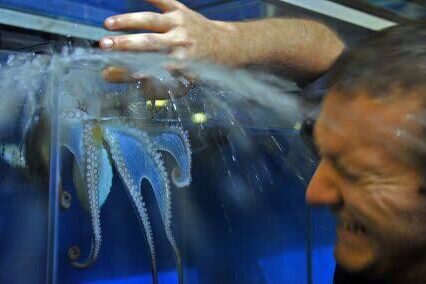
Octopuses may not exactly “hold grudges,” but they do recognize individual humans and remember how they were treated. In lab studies, they’ve been seen squirting water at certain researchers who handled them roughly while being friendlier toward others. This shows not only sharp memory but also the ability to distinguish between people, something unusual for a sea creature. While it might not be revenge in the human sense, the fact that an octopus can single you out for special treatment is unsettling enough to make them feel more like calculating personalities than instinct-driven animals.
10. They play mind games
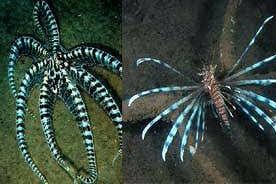
When it comes to survival, some octopus species use deception as their strongest weapon. The mimic octopus, for example, can imitate deadly animals like lionfish, flatfish, or even sea snakes, using its body to mimic their shape and movements. This clever trick fools predators into thinking the octopus is too dangerous to attack. Beyond mimicry, octopuses often manipulate their surroundings, distracting predators or confusing prey with sudden displays of color and movement. These behaviors suggest more than just reflex, they show strategy and foresight. Watching an octopus “pretend” to be something it’s not can feel like witnessing a creature that enjoys playing tricks, almost as if it understands the art of illusion.
11. They eat their own arms under stress
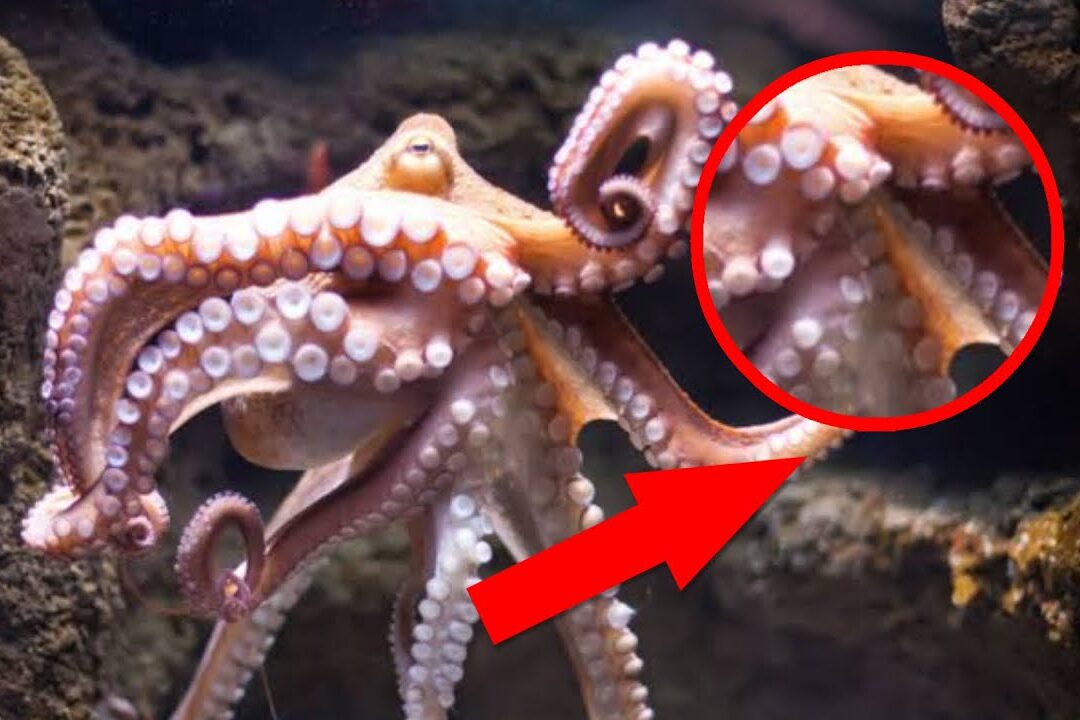
When octopuses are under extreme stress, they sometimes turn to a disturbing behavior: eating their own arms. Scientists aren’t entirely sure why, but it may be linked to disease, poor environment, or even neurological issues. In captivity, this self-destructive act has been observed when octopuses feel trapped or overstimulated. What makes it especially unsettling is that their arms are packed with neurons, meaning they can feel every bite. While this behavior highlights how sensitive and intelligent they are, it also gives them an unnerving edge, most animals don’t respond to stress by consuming parts of themselves. It’s a reminder that their minds work in mysterious ways, sometimes in directions we can’t fully comprehend.
12. They seem to dream
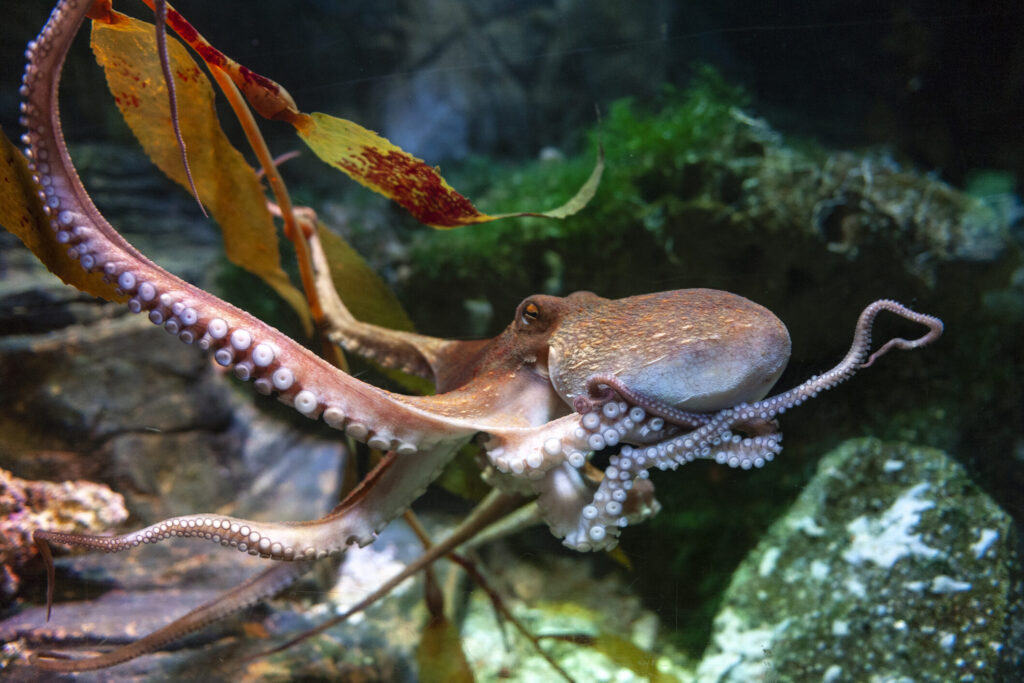
Octopuses don’t just sleep, they appear to experience something like dreams. Scientists have recorded them entering periods of active sleep similar to REM in humans. During these times, their bodies twitch, and their skin flashes through rapid color changes, as if they’re acting out scenes in their sleep. While we can’t know what they’re dreaming about, it’s possible they replay hunting strategies, encounters, or experiences from the day. The idea that a sea creature might dream much like we do challenges how we view intelligence and consciousness in the animal kingdom. Watching an octopus shift through colors in its sleep feels like peeking into the dreamlife of an alien being.
13. They’re so strange, some call them alien
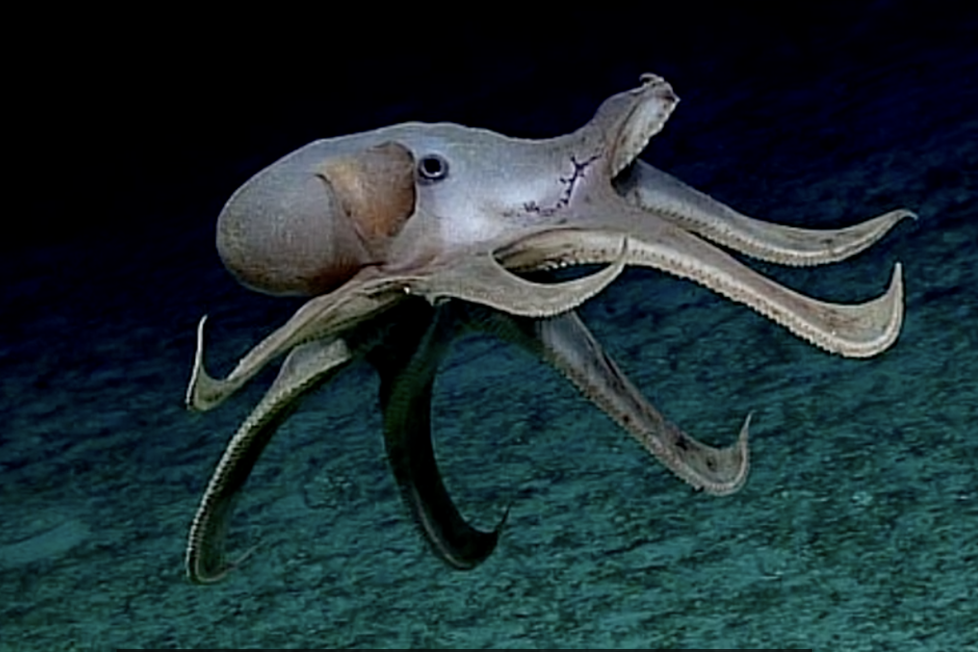
Most scientists agree octopuses evolved naturally on Earth, but their biology is so unusual that some researchers have jokingly (or speculatively) called them “aliens.” With their massive genomes, unique RNA editing, and bizarre intelligence, they seem unlike any other creature in the ocean. While the idea that they arrived on comets is fringe science, the comparison to extraterrestrials persists because octopuses really do feel otherworldly. In that sense, they’re the closest thing we have to real-life aliens living right here in our oceans.
This story 13 Creepy Reasons Octopuses Might Actually Be Evil Aliens was first published on Daily FETCH


